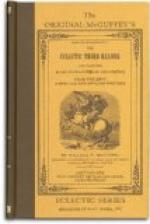tire’some cum’ber some vent’ure some east’ward heav’en ward aft’er ward verd’ure cur’va ture im post’ure smok’y sin’ew y sil’ver y
Lesson 154.
ruff, an article of dress. roar, to make a loud noise. rough (ruf), uneven. row’er, one who rows. retch, to vomit. sail, a sheet of canvas. wretch, a miserable person. sale, the act of selling. rode, did ride. seen, beheld. road, a way; route. scene, a view. rowed, did row. seine, a net for fishing. room, an apartment. slay, to kill. rheum, a serous fluid. sleigh, a vehicle on runners. sow, to scatter seed. sley, a weaver’s reed. sew (so), to use a needle. seem, to appear. so, thus; in like manner. seam, a line of junction.
Lesson 155.
rude, uncivil; rough. slow, not fast. rood, fourth of an acre. sloe, a kind of fruit. serf, a slave; servant. sun, the source of light. surf, a swell of the sea. son, a male child. serge, a kind of cloth. steel, refined iron. surge, to rise; to swell. steal, to rob; to pilfer. sheer, pure; clear. stile, steps over a fence. shear, to cut or clip. style, manner of writing. side, a part; a margin. stare, to look fixedly. sighed, did sigh. stair, a step. slew (slu), did slay. sweet, pleasing to the taste. slue, to slip aside. suite (swet), retinue.
Lesson 156.
Of prefixes.
When a syllable or word is placed before another word, it is called a prefix. The prefix re generally gives the idea of repetition or return; as, recall, to call back.
re build’ re ap pear’ re an’i mate re touch’ re as cend’ re gen’er ate re seat’ re im burse’ re sus’ci tate re view’ ro doub’le re ver’ber ate
The prefix un generally gives a negative meaning; as, unapt, not apt.
un paid’ un friend’ly un court’ly un clean’ un health’y un ea’sy un known’ un stead’y un fruit’ful un nerve’ un err’ing un learn’ed
Lesson 157.
In, also, has a negative meaning; it often becomes im, il, ir, or ig, for the sake of sound.
in act’ive in sin cere’ ir res’o lute im prop’er im po lite’ ir re lig’ious il le’gal il lu’sive irre spect’ive ig no’ble ig’no rant ir’ri ta ble
im ma te ri al’i ty im prac ti ca bil’i ty in di vis i bil’i ty in de struc ti bil’i ty in com pat i bil’i ty ir re sist i bil’i ty in com press i bil’i ty im pen e tra bil’i ty
Lesson 158.
Dis is a Latin particle, and has the force of a negative or privative; as, disagree, not to agree, disarm, to deprive of arms.
dis please’ dis ap pear’ dis con tin’ue dis joint’ dis be lieve’ dis in her’it dis lodge’ dis o blige’ dis or’gan ize dis charge’ dis cour’age dis sim’i lar dis grace’ dis cov’er dis crim’i nate
The prefix after conveys its own meaning.




